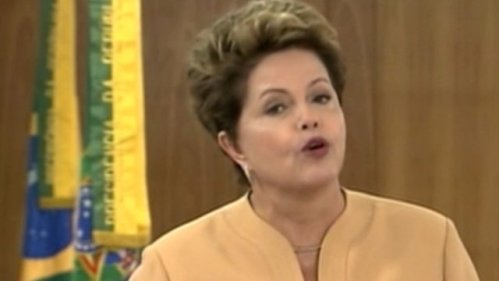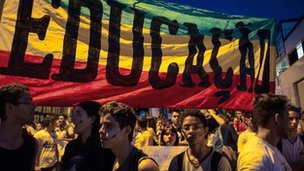|
Brazilian President Dilma Rousseff has unveiled a series of reforms in an attempt to end days of nationwide anti-government protests. In a televised address she said she would draft a new plan to benefit public transport and that all oil royalties would be used in education. She also said that thousands of doctors would be drafted in from overseas to improve the national health service. Earlier she held an emergency cabinet meeting to discuss the protests. The demonstrations began over transport fare rises in Sao Paulo, but quickly grew into rallies across the country against corruption and other issues. On Thursday night more than a million people took to the streets and there was violence in various cities in which dozens were injured and two people died. Protests continued on Friday with an estimated 1,000 people marching in Rio de Janeiro. Witnesses said some stores were looted and an empty arts centre building was invaded. Police were pelted with rocks and responded with tear gas. Demonstrations also took place in Sao Paulo, where traffic was brought to a halt but no violence was reported, and in Fortaleza in Brazil's north-east. In her address - pre-recorded and broadcast nationally on TV and radio - Mrs Rousseff said she was listening to the demonstrators' concerns. She promised to meet the leaders of the peaceful protests saying she needed "their contribution, their energy and their ability". Football anger "I want institutions that are more transparent, more resistant to wrongdoing," she said.
She also defended hosting next year's football World Cup saying Brazil had always been welcomed in international events. "We will treat our guests with respect and make a great World Cup," she said. Answering criticism of the cost of hosting the event, she said the World Cup would be financed by companies that are making use of the sporting arenas. "I would never allow this money to come out of the taxpayers' money, harming essential areas such as health and education," she said. Some of the protests have targeted the Confederations Cup, the eight-team tournament currently taking place which is considered a dry run for next year's World Cup. Demonstrators have expressed their anger at steep ticket prices and the money spent on both tournaments, as well as the 2016 Olympic Games, which Rio de Janeiro is hosting. Football's world governing body, Fifa, has strongly rejected Brazilian media speculation that the Confederations Cup could be cancelled. Source: BBC |

